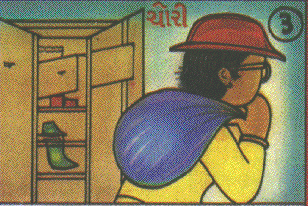Sources of Sins(1 to 5)
Lessons for juniors(13)
Sources of Sins (1 to 5)
We are always busy doing something good that may be helping others or being bad and causing trouble to others. When we help someone, not only does it bring comfort to that someone, but it also brings us comfort by punya. But when we cause trouble for others, it causes us to suffer too due to pap (sins). The kinds of activities that cause others to suffer are called sinful activities and they can range in various levels from a simple tale-telling to the killing. In Jainism such activities are divided into 18 categories and they are considered the sources of the sins that lead to bad karmas or pap. These pap cause trouble in our current lives as well as future lives, too. Therefore, we should be careful not to carry out any of thefollowing 18 sinful activities, which are interconnected with one another.
- Pranatipata (Violence)
- Mrushavada (Untruth)
- Adattadan (Theft)
- Maithun (Unchaste)
- Parigraha (Possessiveness)
- Krodh (Anger)
- Mana (Arrogance)
- Maya (Deceit)
- Lobh (Greed)
- Rag (Attachment)
- Dwesh (Hatred)
- Kalah (Quarreling)
- Abhyakhyan (Accusation)
- Paishunya (Gossip)
- Parparivada (Criticism)
- Liking and disliking (Rati-arati)
- Maya-mrushavada (Malice)
- Mithya-darshan-shalya (Wrong beliefs)
Let us discuss about them one by one.
 Pranatipata: This word is formed by two words. 1) pran means vitalities of living being, and 2) atipata means to kill or to hurt. Therefore, Pranatipata means to cause suffering or kill any of the vitalities of living beings. This is caused by our physical activities as well as by our harsh words, or even by our thoughts. Physical violence is easy to understand. Even then non-vegetarian people do not realize that by eating eggs, chicken, poultry products, fish, sea food, or flash they are causing violence. Hunting or fishing games also cause violence. Verbal violence is caused by name calling, and offensive, hateful, bitter or harsh words or sentences. Let us explain mental violence with an example. Ramesh is a tall and heavy guy and he beats up Anil every now and then. Anil is a skinny guy and can not win Ramesh physically. So, Anil thinks that he will make a friendship with some bully guy and ask him for the help. He also thinks on various other ways to get even with him. During all these thoughts, even though he does not undertake any physical action but his feelings were to hurt Ramesh so he gets sins (pap) as if he was hurting Ramesh. Thus mental thoughts affects us same way as do physical or verbal expressions. Thinking is tremendously faster, easier, and has no inhibition factors than actual physical or verbal activity and hence it increases the potential of accumulation of pap (or even punya due to good thoughts) much faster and more easily.
Pranatipata: This word is formed by two words. 1) pran means vitalities of living being, and 2) atipata means to kill or to hurt. Therefore, Pranatipata means to cause suffering or kill any of the vitalities of living beings. This is caused by our physical activities as well as by our harsh words, or even by our thoughts. Physical violence is easy to understand. Even then non-vegetarian people do not realize that by eating eggs, chicken, poultry products, fish, sea food, or flash they are causing violence. Hunting or fishing games also cause violence. Verbal violence is caused by name calling, and offensive, hateful, bitter or harsh words or sentences. Let us explain mental violence with an example. Ramesh is a tall and heavy guy and he beats up Anil every now and then. Anil is a skinny guy and can not win Ramesh physically. So, Anil thinks that he will make a friendship with some bully guy and ask him for the help. He also thinks on various other ways to get even with him. During all these thoughts, even though he does not undertake any physical action but his feelings were to hurt Ramesh so he gets sins (pap) as if he was hurting Ramesh. Thus mental thoughts affects us same way as do physical or verbal expressions. Thinking is tremendously faster, easier, and has no inhibition factors than actual physical or verbal activity and hence it increases the potential of accumulation of pap (or even punya due to good thoughts) much faster and more easily.
Some other forms of violence are piercing, crushing, binding, torturing, and overloading the animals; starving or not feeding at proper times, and exploiting laborers. Cosmetics, ivory, silk clothes, or leather articles involve the direct or indirect injury to the animals and are reasons for accumulation of sins. One should be careful even while walking, running, sitting that one does not step on the small insects like ants and tiny bugs. We should be careful not to walk on plants or grass because they have life. Taking such care is called “Jatna” “Upayoga” in Jainism. Therefore, we should be very careful and live a simple peaceful life. This leads one to be compassionate and tolerant of others.




- Other thirteen sins are described in the next two chapters.

